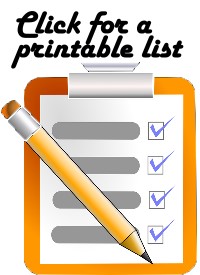Next Stop, Emergency Room! - 10 Tasks to Tackle Beforehand

by Carol White Llewellyn
What comes to mind when someone says the words “Emergency Room?” If you’re a parent, I bet your child comes to mind first, along with all the dreadful accidents that could occur that might land him or her there. Scary thoughts! But what if we’re not talking about your child? What if we’re talking about some accident that might land your spouse or partner in the hospital and unable to communicate? That recently happened to me when my husband ended up in emergency, then ICU. Initially, the doctors thought it was pancreatitis but it turned out to be an aneurysm that burst in his chest while there. By the time I learned what I didn't know, my husband was unconscious.
Our family, like most busy families, requires a separation of chores to do all that needs to be done, depending on who is more comfortable doing what tasks. Sometimes it’s skill- or interest-based, other times it’s based on practicality or which partner’s employment covers the family benefits. Chances are, you know little about the things you don’t handle. There’s always a good reason for the things you don’t know, but when you have an emergency, the “don’t knows” add significantly to your stress level. So being prepared in advance can make an enormous difference. Give yourself the gift of gathering together the following information into one place that family members can access in the event of an emergency. Let's hope it is never needed, so what you're really giving yourself is peace of mind for now. Just get a simple notebook with, ideally, some pockets for representative documents.
What you need to know
q Your spouse or partner's position and title, boss’s name and contact information, and his or her work address.
q The contact information for each partner's human resources department, plus each partner's username and password to the online benefits site.
q Access information for phones, computers, emails, social media, safes, and other repositories for confidential information.
q Location of power of attorney and health proxy documents (and get these if you don't already have them!).
q Information about all wills: Where they are, who is executor, and executor's contact information.
q Make sure you have all financial information and access to accounts, even if one partner manages all of the bills.
Master List of What To Gather
1. Personal Information for all family members
Have social security number, date of birth, place of birth, driver’s license number and expiration, and yes, even mother’s maiden name for all members of the household.
2. Employment/Business Information
Employer, boss's name and his/her contact information, HR information, and how to access benefits. If self-employed, names and contact information of partner(s) or staff who can be relied on to step in and manage business temporarily.
3. Benefits
What vacation, disability, health, and death benefits are in place? Whom should be contacted and by what means to activate those?
4. Will, health proxy, power of attorney
I can’t state how important these are! Make sure you have them, know where they are, and how to access them. A personal, small, fireproof safe is relatively affordable and you have 24/7 access to the information without having to wait for a bank to open to get into a safety deposit box.
5. Doctor, Dental and Medical Information
List all family doctors, who sees whom for what, their contact information, and all medicines and dosages. This could be critical information if your loved one is admitted to the hospital in an unconscious state. Know where to find the insurance card.
6. Bank and Investment Accounts
Include bank or investment firm, types of accounts, account numbers, and all pertinent information.
7. Access to electronics and critical accounts
Have username and password to all electronics which retain critical contacts and information.
8. Charge Cards
Have a list of all charge cards for the household, their account numbers, expiration dates, CVV numbers, when payment is due, and maximum balance. Include what financial institution holds them and how payment is made. Store the list in that safe you bought for the above information.
9. Rent, Mortgage, Timeshare and Property Tax information
How much is paid, when, where, and to whom?
10. Loans – Auto, boat, college, etc.
How much is paid, when, where, and to whom? What is still owed?
Click here to get the above list in a printable PDF checklist to make it even easier!
Some of the above may not be pertinent to your family, or you may discover other concerns not listed here that apply. However, if you have an emergency and a loved one – whether parent, spouse, partner, or child – is admitted to the hospital, if you have gathered this information in advance, I guarantee this will reduce anxiety in an already stress-filled situation.
P.S. I also have to add one further unsolicited word of advice. When you’re young, healthy, and having a challenge making it from paycheck to paycheck, life insurance seems like an unnecessary extravagance. That is actually the time to buy it, because your premiums will be more affordable. The peace of mind offered by life insurance is one of the most loving gifts you can give your family, to make sure your assets are protected in the event that something happens to one of the parents.
Carol White Llewellyn is editor of BeyondtheNest.com, KidsOutAndAbout's sister site for grownups who are interested in opportunities for arts, culture, and recreation in their local area.

